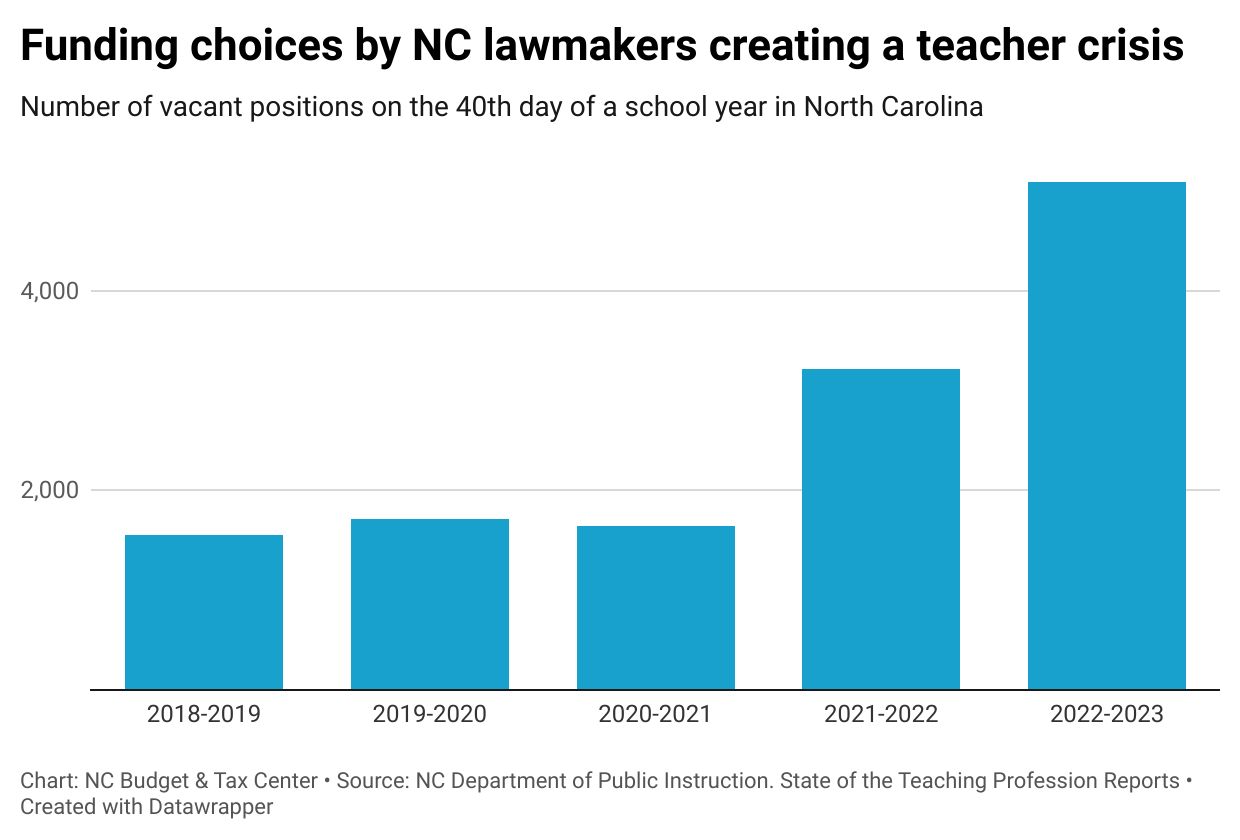
NC schools are struggling to survive while rich people and corporations keep getting tax cuts
In 2013, the NC legislature started cutting taxes (mostly for big corporations and wealthy people). Most years since have NC lawmakers continue to divert public funds from things like schools, childcare, broadband, water quality, and public safety, to the pockets of out-of-state corporations and the wealthy few. These cuts also put more of the burden on middle- and low-income taxpayers while letting their richer neighbors off the hook. This post is part of a series bringing light to how tax cuts have failed to deliver promised benefits while undermining our ability to pay for things North Carolinians need.
Do you wake up wondering if you’re going to be late to work because the school bus didn’t show up on time … again?
Or when your kid is going to have a full-time, permanent, teacher?
Or why your child comes home crying because they’re not getting what they need to overcome a learning, language, or social barrier?
Or when the A/C in the school gym is going to get fixed?
Or, or, or…
If so, you’re not alone. Things in our schools really are getting worse, and it’s directly because of policy choices being made in Raleigh.
Wave after wave of tax cuts have diverted public dollars into the pockets of wealthy people and corporations, all while the General Assembly has refused to give schools the funding they need to find and keep teachers, bus drivers, janitors, counselors, and other people it takes to nurture our children. At the start of this school year, there were more than 5,500 vacant teaching positions in North Carolina, and less than 500 of those spots had been filled within the first 40 days of the school year.
It didn’t used to be this way.
On the first day of school in 2018, there were about 1,550 open teaching positions in North Carolina’s public schools. Vacancies inched up over the next few years as continued underfunding made it harder to find and keep qualified teachers. State lawmakers had turned up the heat in the 2017 budget when they decided to drop retirement health benefits for teachers and other state employees hired after 2020.
Then COVID-19 and the inflation it created turned a rising simmer of a problem into a rolling boil of a crisis. The raises approved by the General Assembly in the past two years came nowhere close to covering the cost of living, forcing a lot of teachers, bus drivers, and other school employees to look for better-paying jobs somewhere else. Even when the budget was passed last year with modest raises, inflation running faster than raises effectively meant state employees had lost more than 2.5 weeks worth of pay, and rising prices have eaten into public servants wages even more since then.
The result was an explosion in vacancies. There were almost 2.5 times more open posts in 2021 than 2018, which has climbed to over 3.5 times more this school year. Districts have been forced to staff some classrooms with long-term substitutes or other employees who are “not lasting solutions to the vacancy issue and are only stop-gap (in most cases) employed by the local educational agency until a full-time, permanent, fully-licensed teacher can be found.”
And the problem doesn’t stop at the classroom door.
Every morning and afternoon parents across North Carolina get calls updating them on which buses are running late, or not at all. The Department of Public Instruction doesn’t track all school vacancies like they do for teaching positions, but the NC Superintendents Association did a survey at the start of the year that showed our schools were trying to fill over 1,300 bus driver slots across the state. Some districts with more local resources are increasing pay to attract more bus drivers, but a lot of districts simply don’t have the funds it would take to offer drivers enough to keep them from leaving for better-paying jobs.
Unpredictable bus routes are particularly hard on parents with the least control over their work schedules, a lot of whom are women and people of color who are paid the worst wages in North Carolina. Even parents with more flexible workplaces may be forced to forego promotions or new job opportunities, knowing that they can’t reliably count on when their kids are going to get picked up or dropped off.
And it’s not just families with children that suffer.
A whole generation of children are not getting the start in life they deserve and our future economy relies upon. Parents who are constantly leaving work to pick up their kids or stressed out because their children aren’t getting the support they need at school aren’t able to bring their best to the workplace. Underfunded schools make it harder for companies to get people to move to North Carolina, a problem that will only worsen the longer we deny public schools the resources they need.
Sometimes it takes a crisis to cue into a problem that has been growing for years, and that’s what we’re seeing with school vacancies this year. The General Assembly has repeatedly chosen tax cuts for wealthy people and corporations over adequately funding our schools, and now those chickens are coming home to roost. COVID-19 and inflation have worsened a pre-existing condition so now even more heroic measures are required than if we had dealt with the problem earlier on. Legislators need to hear that we’ve had enough calls about late buses, enough notices that a beloved teacher is moving on, enough apologies from school leaders without the resources they need to fix crumbling buildings.
We’ve had enough, and it’s time to stop the tax cuts and give our children the education they deserve.


